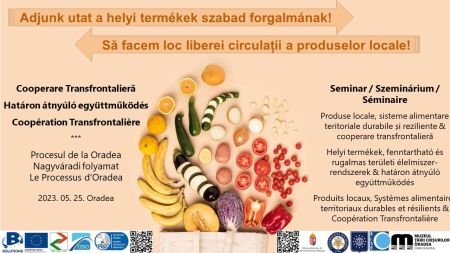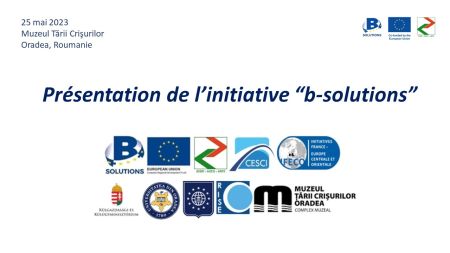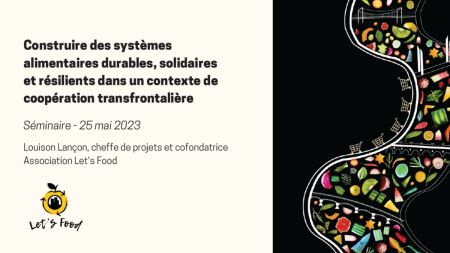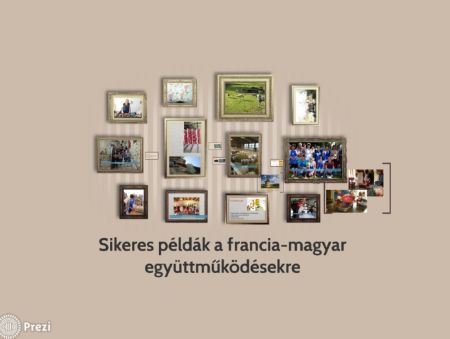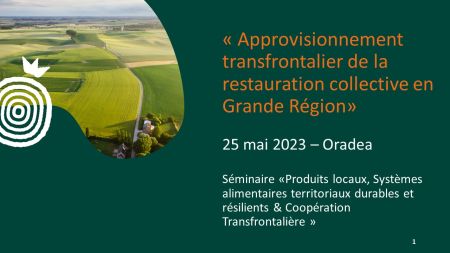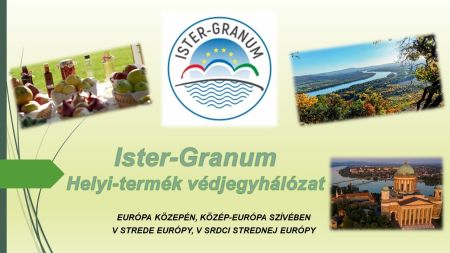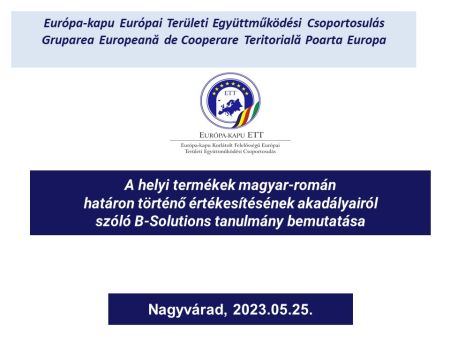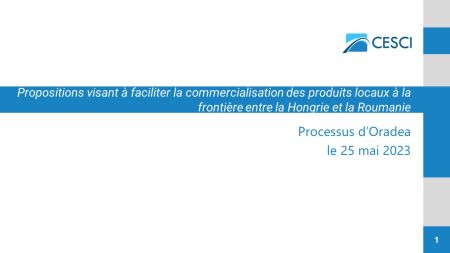A Francia-Magyar Kezdeményezések Egyesülete (INFH), a Nagyváradi Metropoliszövezet és a CESCI 2012 óta rendezi meg tematikus konferenciáit annak érdekében, hogy a magyar és román intézmények, önkormányzatok és emberek között egyre inkább állandóvá és általánossá váljon az együttműködés. A francia szakértők bevonásával idén a helyi termékek és a fenntartható területi élelmiszer-rendszerek kerültek a figyelem középpontjában, természetesen határon átnyúló kontextusban.
Elsőként Stefan Josan, a romániai francia nagykövetség képviselője köszöntötte a hallgatóságot és kiemelte, hogy a konferencia különleges alkalmat biztosít arra, hogy a franciaországi jógyakorlatokat a román és magyar részvételű hallgatóság első kézből ismerhesse meg. Ezután dr. Sorin Borza a Nagyváradi Egyetem nemzetközi kapcsolatokért felelős rektorhelyettese köszöntötte a résztvevőket, kihangsúlyozva azt, hogy a helyi termékek képezik az adott közösség egyik legfontosabb erőforrását és ezért kiemelten fontos okosan gazdálkodni velük. Ehhez a mondanivalóhoz jól kapcsolódott Antonia Nica Nagyvárad alpolgármesterének köszöntője, aki egy több mint száz évvel ezelőtti feljegyzést osztott meg a hallgatósággal, ami jól illusztrálta azt, hogy a helyben előállított zöldségféle, gabona és húsárú mindig is organikusan cirkulált a határtérségben annak érdekében, hogy az itt élők minél frissebb és szélesebb körű ellátáshoz jussanak.
A szemináriumot José Osete, az IFECO igazgatója moderálta, aki röviden bemutatta a Nagyváradi folyamat történetét és eddigi eredményeit, majd átadta a szót Mariane Bloudeau-nak, az AEBR projektmenedzserének, hogy ismertesse a hallgatósággal a B-Solutions kezdeményezést. A 2019-ben a Bizottság kezdeményezésére elindított B-Solutions célja a határon átnyúló együttműködést gátló jogi és adminisztratív akadályok feltárása és megoldási javaslatok megfogalmazása. Erre azért van szükség, mert a jogszabályok gyakran nem veszik figyelembe a határtérségek sajátosságait és az itt élő közösségek specifikus szükségleteit. Az ilyen akadályokat egész Európából érdemes tehát összegyűjteni, mert ez segítheti az uniós politikák változását is. A jelenleg futó, a helyi termékek határon átnyúló forgalmazásának lehetővé tételét segítő projekt célja, hogy az egységes piac valódi értelmet nyerjen a határtérségekben.
Ez azért is nagyon fontos, mert – ahogyan azt Louison Lançon, a Let’s Food Egyesület társalapítója és projektvezetője kiemelte – a globális élelmezési rendszernek számos környezeti, társadalmi és egészségügyi negatív következménye van, amelyet leginkább a termőföld megőrzésével, az agrár szakmák védelmével, a helyi termékek előtérbe helyezésével, a pazarlás megszüntetésével, a helyi hatóságok támogatásával lehet elérni. Jó gyakorlatként említette a Montpellier-ben futó „Ma Cantine Autrement” kezdeményezést, amely a közétkeztetésben, napi 15.000 adag étel előállításának folyamatában veszi azt figyelembe, hogy 50%-ban helyi termékeket használjanak fel, amelynek 20%-a biotermék. Előadásában továbbá aláhúzta, hogy a globális polgársági szemléletmódot kell erősíteni, azaz a határ ne legyen akadály, inkább érkezzen az adott termék 20 km-ről, de a határ másik oldaláról, minthogy utazzon sok száz kilométert, szennyezve a környezetet és veszítve a frissességéből.
Noha a helyi termékekre épülő rövid ellátási láncok kialakítása nem mindig egyszerű feladat, Kujáni Katalin, a Kislépték Egyesület elnökének előadásából kiderült, hogy vannak már sikeres példák. Korábban hatékonyan működött már együtt négy francia és két magyar LEADER csoport annak érdekében, hogy megalkossanak egy helyi chartát a helyi termelők számára, de vannak jelenleg is futó projektek, mint például a közös termelői pontok kialakítása, ahol a helyi termékeket közös, szervezett módon lehet forgalmazni.
Az mindenképp egyértelműen látszott a szemináriumon is, hogy potenciál lenne a határ mindkét oldalán. Sorin Pogana, a Fresco Verde ügyvezető igazgatója elmondta, hogy a Bihar megyei cég Románia legnagyobb zöldségfeldolgozója, Global Gap tanúsítvánnyal rendelkeznek, és több áruházlánc is árusítja a termékeiket. Bár 150 gazdával dolgoznak együtt, akikből már egy közösség jött létre, mégis csak elvétve vannak magyar oldali beszállítóik, amely rámutat a határon átnyúló gazdasági kapcsolatok hiányosságára.
Ezzel szemben Sophie Lewandowski, a területi szolidáris gazdaságért felelős tisztviselő a Meurthe-et-Moselle megyei adminisztrációnál, elmondta, hogy a régió az élelmiszer 98%-át importálja, miközben a saját maga által termelt élelem 97%-át exportálja. Az előadásában bemutatta a Nagy Régió területén 2,3 millió euróból megvalósuló AROMA INTERREG V-A projektet, amely a közösségi étkeztetés helyi élelmiszerekkel való ellátásának javítását célozta határon átnyúló viszonylatban. A legfőbb tapasztalat az volt, hogy kellenek helyi animátorok, akik hatékonyan szervezik meg a helyi termelőket, illetve ki kell alakítani elosztópontokat, online megrendelési rendszert, chartát.
Egy másik támogatható irány lehet egy határon átnyúló védjegyrendszer kialakítása, amelyre példát Nagy Péter, az Ister-Granum ETT igazgatója hozott a magyar-szlovák határtérségből. Az előadásból kiderült, hogy bár a védjegy létrehozása több évbe telt és nagyban függött az ETT aktív feladatvállalásától, mégis a térségbe látogató turisták számára egy hasznos és megbízható referenciaponttá tudott válni, egyesítve mintegy 500 helyi termelőt a határ mindkét oldaláról.
A szeminárium két záró előadása a magyar-román határ vonatkozásában tárgyalta a helyi termékek forgalmazási lehetőségét. Kovács Apor, az Európa-kapu ETT igazgatója a helyi termékek magyar-román határon történő értékesítésének akadályairól szóló B-Solutions tanulmányt mutatta be, amely a rendezvény közvetlen apropókát is adta, míg Ocskay Gyula, a CESCI főtitkára a megoldási javaslatokat térképezte fel. Az előadásból kiderült, hogy korábbi kutatások azt mutatják, hogy mind a vásárlók, mind pedig a termelők körében lenne nyitottság a helyi termékek határon átnyúló forgalmazására, amennyiben az kölcsönösségen alapszik. Ezt azonban jelenleg a jogszabályok nem teszik lehetővé, amit vagy kétoldali jogharmonizációval, vagy közvetítőn keresztüli forgalmazás útján, vagy pedig a határ közvetlen közelében létesített piacok kiépítésén keresztül lehetne áthidalni.
A szeminárium a hallgatóság kérdéseinek megválaszolásával, majd közös – helyi termékeken alapuló – ebéddel végződött, a folyamat azonban a remények szerint tovább folytatódik mind a B-solutions projekt, mind pedig a Nagyváradi Folyamat keretein belül.
